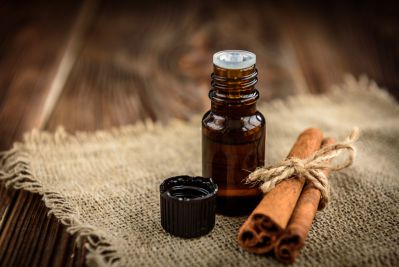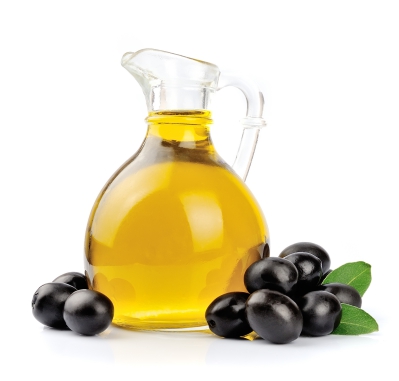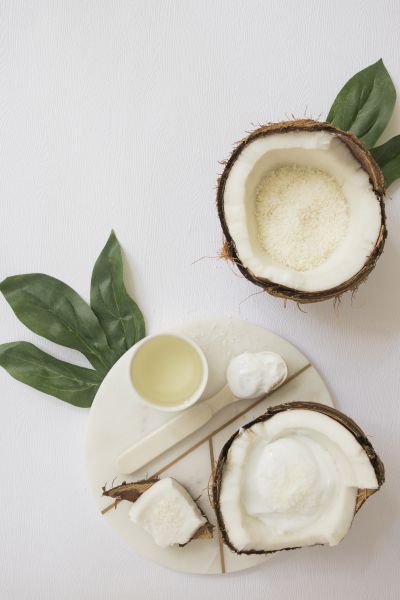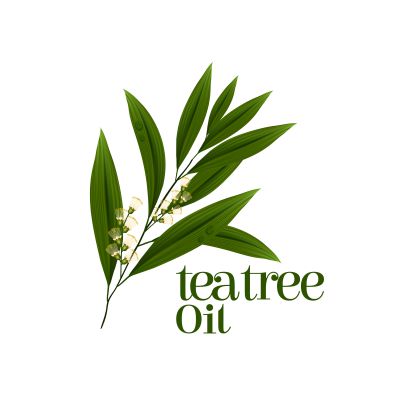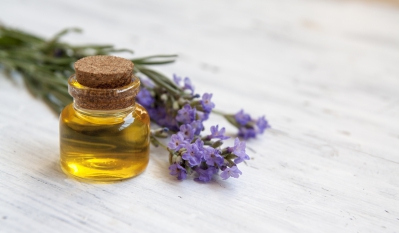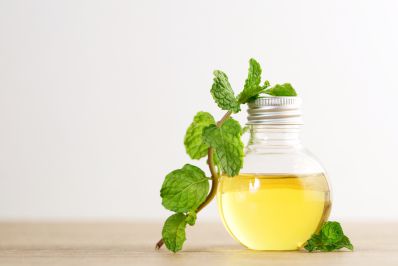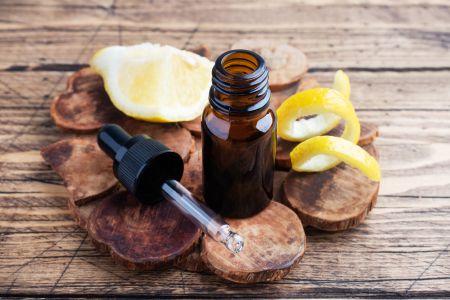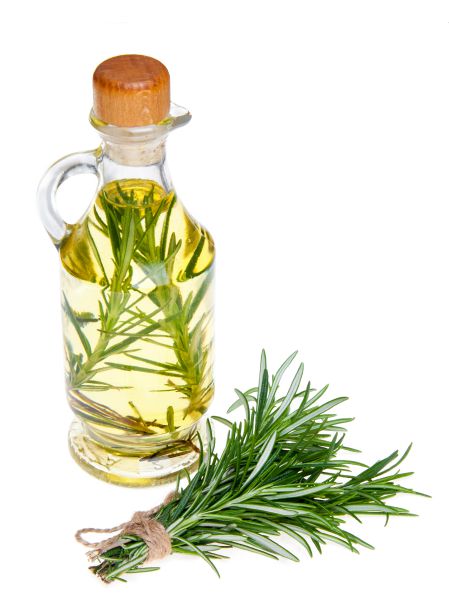Cinnamon oil is an important essential oil derived from cinnamon plant, which belongs to Lauraceae botanical family. It mainly derived through steam distillation method. It is very popular for its characteristic flavor and it is extensively used in aromatherapy as well as for medicinal purposes.
Cinnamon bark oil and cinnamon leaf oil
The essential oil derived from the bark and leaves of cinnamon plant is called cinnamon bark oil and cinnamon leaf oil, respectively. Each oil has great health importance. Cinnamon bark oil is widely used as a flavoring agent and used for medicinal purposes. Cinnamon leaf oil is used for the same purposes as well, but it may also be used for various industrial applications. Cinnamon bark oil contains more cinnamaldehyde than leaf oil and hence has relatively stronger cinnamon aroma than leaf oil. On a contrary cinnamon leaf oil contains more phenolic compounds and eugenol than bark oil.
Characteristics
- It is physically liquid in room temperature
- It has a pungent taste due to the presence of cinnamaldehyde
- It is slightly soluble in water but completely soluble in alcohol
- It has a sweet, cinnamon and spicy scent
- It has comparatively higher density than water
- It has seen that it becomes thicker and darker when exposed to air
- Heating it at a high temperature decomposes its structure and produces irritating fumes and smokes

Nutritional profile
- It contains moderate amount of carbohydrate and significant amount of dietary fibre
- It also contains fat
- It contains lesser amount of proteins
- It produces energy during its cellular oxidation as it contains both fat and carbohydrate
- It also contains various vitamins like Vitamin A, Vitamin K and Vitamin B complex
- It contains several trace elements such as calcium, phosphorus, iron, magnesium and potassium
- It is rich in various biologically active compounds which are responsible for exerting antioxidant, anti-inflammatory, antifungal, anti-flatulence and antiseptic activities. These compounds include cinnamaldehyde, eugenol, cinnamyl acetate, eugenol acetate, methyl eugenol, cuminaldehyde, cinnamyl alcohol, linalool, benzaldehyde, benzyl benzoate, carophyllene, monoterpene hydrocarbons, safrole and isocaryophyllene
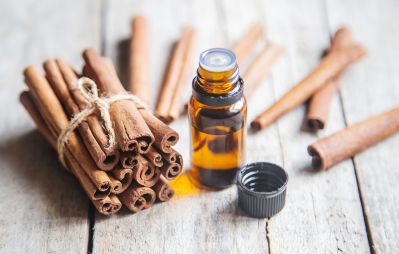
Health benefits
- Antioxidant and anti-inflammatory property
- Eugenol, gamma-terpinene, phenol, salicylic acid, camphene and picatechin are considered as the main components that exert antioxidant activities and protect the body from oxidative damages by reducing the concentration of free radicals
- Polyphenolic compounds of cinnamon oil have shown potent anti-inflammatory activities and help to inhibit the occurrence of inflammatory events within body. Hence, reduces the prevalence of degenerative diseases
- Antimicrobial property
- It helps to prevent the growth of harmful bacteria, virus and fungus within host
- Cinnamaldehyde of cinnamon has strong bactericidal effects and helps to kill both gram positive and gram-negative bacteria by destroying their cell membrane
- It also helps to prevent the growth of fungus (yeast and molds)
- It has seen that cinnamon oil or extraction of cinnamon shows antiviral effects against HIV

- Role on oral health
- Streptococcus mutans (bacteria) and candida ssp (yeast) are considered as main two causative factors for oral infections, gum disorders, dental plaque formation and cavities
- Antibacterial and antifungal property of cinnamon oil play significant role on preventing the growth and reproduction of these above stated microbes within mouth and promotes oral health
- Role on gastrointestinal health
- It helps to promote digestion by stimulating the secretion of digestive enzymes
- It is also associated with enhancing bowel movement and helps to promote bowel and colonic health that reduces the susceptibility of developing gastrointestinal disorders
- It has carminative effect which is related with preventing gas formation within digestive tract and also helps in gas expulsion that helps to reduce the prevalence of flatulence
- It helps to inhibit the growth of Helicobacter pylori and other inflammatory pathogens, which helps to reduce the prevalence of gastric ulcer formation and inflammatory bowel diseases
- Nematicidal effects
- We all know that using of pesticides have harmful effects on human health as well as on the environment and these are becoming a vital health concern worldwide
- To minimize the harmful effects of pesticides it is better to use some natural alternative sources
- It has seen that cinnamaldehyde component of cinnamon oil is specifically toxic against Bursaphelenchus xylophilus and hence can be used as natural pesticides

- Acaricidal and repellent effect
- House dust mites are considered as a chief source of allergy in households. Basically, the allergen comes from the dead bodies of dust mites or from their fecal matter
- They are responsible for developing several complications within body such as dermatitis, perennial rhinitis, infant death syndrome, asthma etc. These complications should be prevented earlier otherwise it would become fatal. Several chemicals such as benzyl benzoate and N, N-diethyl-meta-toluamide are used to control this mite species but excessive usage of these chemicals also cause harmful effects on human health
- It is better to use natural repellent substance for their control as natural repellent does not show any harmful consequences in human health. It has seen that cinnamon oil has strong acaricidal and repellent effects on house dust mites and can be effectively utilized for this purpose
- Role on mental health
- It helps to boost the mood
- It also provides relaxing and calming effects, which help to prevent anxiety, stress and depression
- Role on blood circulation
- Cinnamaldehyde and Vitamin K content of cinnamon oil are responsible for preventing blood clotting within blood vessels hence help to reduces the prevalence of stroke and coronary artery diseases
- They also promote blood circulation as it reduces blockage within blood vessels by preventing clotting. Proper blood supply throughout the body is very important as it is related with supplying sufficient oxygen and nutrients to every cells of the body, which are responsible for optimum cellular growth, survival, metabolism and nourishment

- Other benefits
- It helps to enhance immunological responses of body
- It helps to stimulate libido
- It helps to stimulate hair growth and prevents hair fall and dandruff
- It helps in rapid wound healing
Medicinal usages
- It helps to prevent diabetes mellitus by enhancing the activity insulin receptor kinase that is associated with reducing glucose uptake
- It helps to increase the synthesis of HDL and reduces the concentration of LDL and prevents LDL oxidation. This feature is related with improving lipid profile and cardiac health
- Antitumor property of cinnamon oil helps to prevent the proliferation of malignant cells and reduces the prevalence of cancers. It also acts as a strong natural source of anti VEGF agent, which is responsible for preventing angiogenesis
- It also helps to slow down the progression of Alzheimer’s’ disease
- It has potent analgesic effects that help to reduce pain. It is very effective for preventing headache and the pain of arthritis (swelling of joints)
- It also helps to prevent multiple sclerosis

Applications of cinnamon oil
- It is widely used as an effective flavouring agent
- It is also used as an ingredient of toothpaste, soap, body lotion and mouthwash
- It is widely used in aromatherapy
- It is also used as food preservative
Risk factors
It is better to use cinnamon oil in diluted form or added with some other oil otherwise it may develop skin irritation. It also damages kidney and liver in excessive amount.

Source:
Cardoso-Ugarte, G.A., López-Malo, A. and Sosa-Morales, M.E., 2016. Cinnamon (Cinnamomum zeylanicum) essential oils. In Essential Oils in Food Preservation, Flavor and Safety (pp. 339-347). Academic Press.
El Atki, Y., Aouam, I., Taroq, A., El Kamari, F., Timinouni, M., Lyoussi, B. and Abdellaoui, A., 2020. Antibacterial effect of combination of cinnamon essential oil and thymol, carvacrol, eugenol, or geraniol. Journal of Reports in Pharmaceutical Sciences, 9(1), p.104.
Goel, B. and Mishra, S., 2020. Medicinal and Nutritional Perspective of Cinnamon: A Mini-review. European Journal of Medicinal Plants, pp.10-16.
Haddi, K., Faroni, L.R. and Oliveira, E.E., 2017. Cinnamon oil. In Green Pesticides Handbook: Essential Oils for Pest Control (pp. 117-150). CRC Press.
Jeong, Y.J. and Choi, J.S., 2020. Antimicrobial Effect of Cinnamon Oil Against Oral Microorganisms. Medico Legal Update, 20(1), pp.1591-1594.
KA, M.T.A., Roy, A. and Rajeshkumar, S., 2019. Anti-inflammatory activity of cinnamon oil mediated silver nanoparticles-An in vitro study. International Journal of Research in Pharmaceutical Sciences, 10(4), pp.2970-2972.
Shabani, N.R.M., Ismail, Z., Ismail, W.I., Zainuddin, N., Rosdan, N.H., Roslan, M.N.F. and Mohd Azahar, N.M., 2016. Antimicrobial activity of cinnamon oil against bacteria that cause skin infections. JSRAD, 3(2), pp.1-6.
Vasconcelos, N.G., Croda, J. and Simionatto, S., 2018. Antibacterial mechanisms of cinnamon and its constituents: A review. Microbial pathogenesis, 120, pp.198-203.
